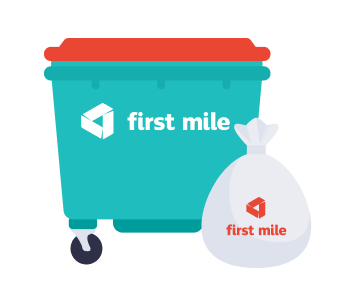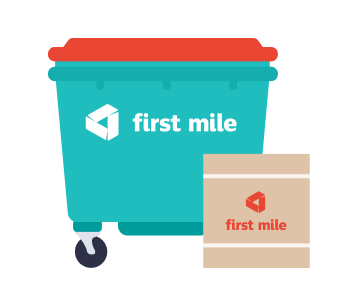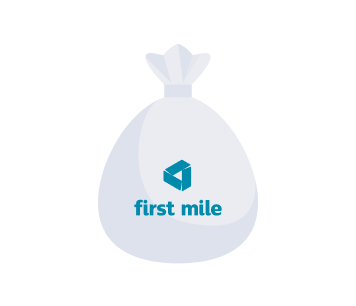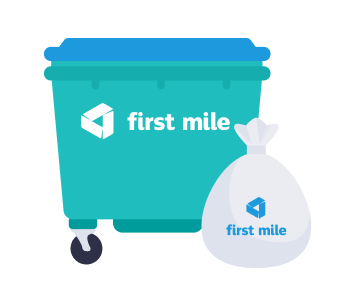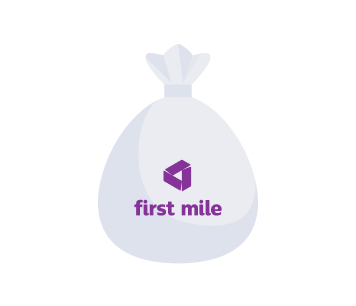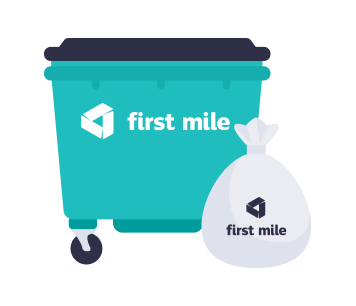Textile Recycling for your business
Each year around 350,000 tonnes of clothing and textiles are sent to landfills, but most of this can be reused or recycled!
First Mile offers a pay-as-you-go sack collection service to help you recycle any clothing waste your business produces.
Simply order our sacks (each capable of holding around 50 t-shirts in weight, and we will come and collect them at a time that suits you best.
Plus we offer lots of great service extras such as a 24/7 support, an online customer portal where you can order more sacks, industry-leading carbon reporting and more.
How does pricing for textiles recycling collection work?
Sack collections
The price shown for our textiles recycling sack service is per sack (+VAT).
Sacks are sold in quantities of 10 on a pay-as-you-go basis with no contract required.
The upfront cost includes the cost of collection and recycling of materials, documentation and service extras, with no hidden costs.
What can go in Textiles Recycling Recycling sacks?
Please keep out of Textiles Recycling sacks
Why set up a Textiles Recycling collection with First Mile?
Clothes Textiles with First Mile
Every textile recycling sack collected by First Mile is carefully sorted. All clothes in good condition are then sent to wholesalers in developing countries where local market traders sell them on.
Damaged clothes that can’t be fixed are sent to a recycling facility where they’re separated, shredded and turned into new materials. Simply add a clothes recycling bin to your workplace and get your team to start recycling garments straight away.
If you’re a fashion brand and produce a high amount of clothes frequently, we can help your company by recycling fabric scraps and product samples so they don’t end up incinerated or in a landfill.
Textiles Recycling FAQs
Do you offer rubbish removal near me?
Do you offer rubbish removal near me?
We offer rubbish removal in London and Birmingham around our major sorting plants, as well as across the country. The best way to find out if we’re in your area is to check your postcode and see if this service is available near you!
Who are Envar?
Who are Envar?
First Mile has partnered with Envar to recycle coffee grounds in the best possible way to help our environment. They specialise in composting green and food waste on a large scale, and are experts in their field, meaning they know exactly what to do with any form of coffee waste.
Why use First Mile?
Why use First Mile?
As one of the leading waste management companies in London, Birmingham and the UK, First Mile has already helped over 30,000 businesses to reduce their carbon impact with our range of recycling services - with over 200 new businesses signing up each week.
By choosing First Mile, you’ll benefit from a low cost, reliable service, a 24/7 helpdesk, and free monthly reporting. You can view our accreditations above and our certificates and insurances here.
What are cartons made of and are they recyclable?
What are cartons made of and are they recyclable?
The average carton is made up of at least three layered materials: 75% paperboard (from wood), 21% polyethylene (a type of plastic) and 4% aluminium (on long-life or aseptic packages only). It's this unique combination that makes carton packaging safe and efficient to store food and drinks, but it also means that recycling cartons require a very special process.
After collection, cartons are taken to a specialist facility where they're soaked into water to separate the paperboard fibres. These are then dried and recycled into new paper products. The recovered plastic and aluminium layers are separated and turned into garden furniture, industrial products and building materials.
The process of recycling cartons isn't the easiest, but it is possible. Still, worldwide, less than 20% of cartons packaging is recycled - we can and must do better. First Mile recycles cartons in the UK, reducing the carbon footprint necessary and ensuring that nothing ends up in a landfill.
